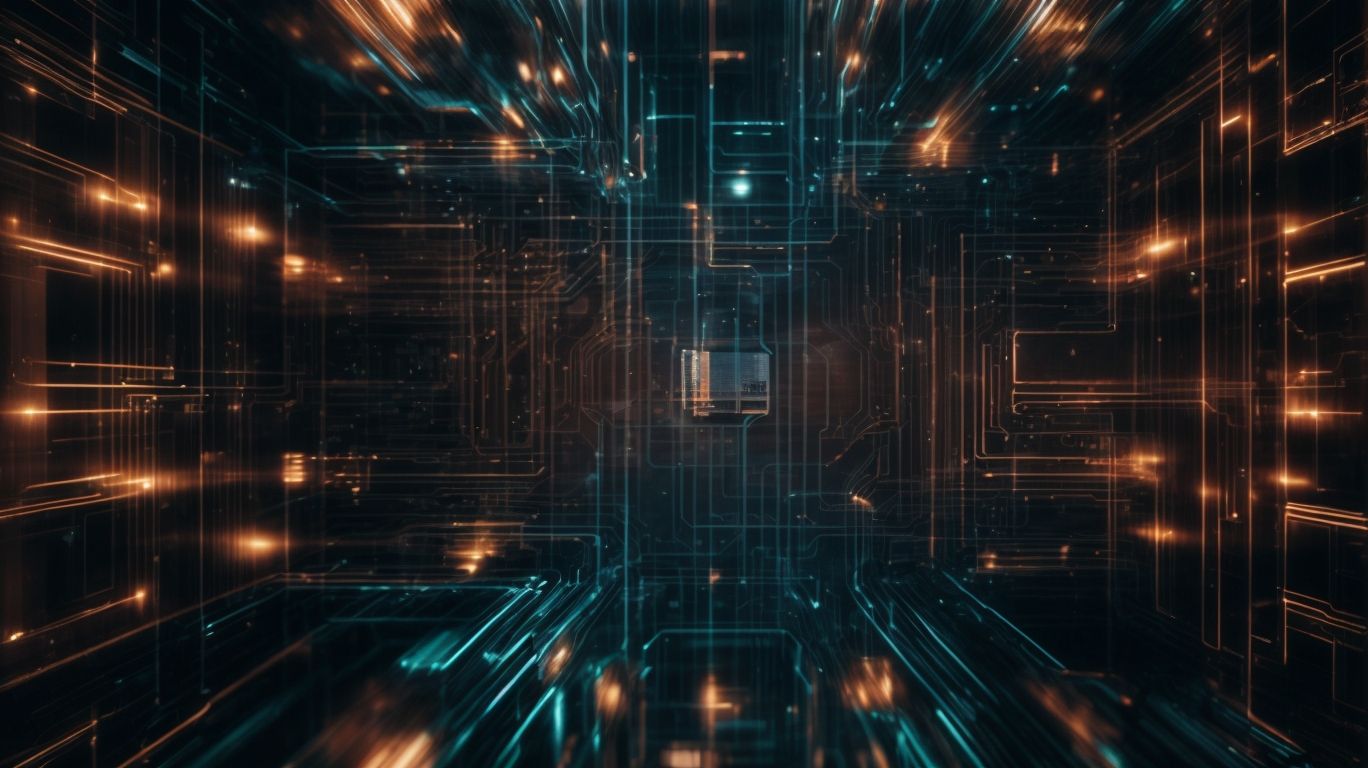Curious about the mysterious world of the Dark Web?
We will explore what the Dark Web is, how it differs from the Deep Web, and how people access it.
Discover the risks involved in navigating the Dark Web, such as exposure to illegal activities, malware, scams, and identity theft.
Learn important precautions to stay safe while exploring this hidden part of the internet. Let’s uncover the secrets of the Dark Web together.
Table of Contents
Key Takeaways:
Navigating the Dark Web can expose you to illegal activities, malware, scams, identity theft, and law enforcement monitoring.Precautions such as using a VPN, keeping antivirus software updated, using a separate device, and avoiding suspicious links can help protect you while accessing the Dark Web.Cryptocurrency is the preferred method of payment on the Dark Web, but caution should still be exercised to avoid being scammed or hacked.
What Is the Dark Web?
The Dark Web refers to a hidden part of the internet that is not indexed by traditional search engines and requires specific software to access, offering users a level of anonymity and encryption for their online activities.
It serves as a platform for various activities, including illegal transactions, data exchange, and communication in an environment that thrives on anonymity. The structure of the Dark Web is intricate, with websites being hosted on encrypted networks, making them inaccessible through regular browsers. Data flowing through the Dark Web is encrypted, providing a shield against surveillance and tracking by authorities. This encrypted communication channel creates a veil of secrecy around users’ identities, attracting those seeking privacy or engaging in illicit operations.
What Is the Difference Between the Dark Web and the Deep Web?
The Dark Web and the Deep Web are often confused, but they serve different purposes. While the Deep Web consists of all web pages not indexed by standard search engines, the Dark Web specifically refers to the part of the internet that requires specific tools to access and is often associated with illicit activities.
One of the key differences between the Deep Web and the Dark Web is the type of content they host. The Deep Web mainly includes content that needs authentication or access permissions, such as online banking platforms, private databases, and academic libraries.
On the other hand, the Dark Web harbors websites and forums that operate on encrypted networks, allowing users to remain anonymous while engaging in illegal transactions and activities.
Moreover, the Deep Web is used by individuals and organizations to store sensitive data securely, away from the prying eyes of search engines, whereas the Dark Web is infamous for hosting marketplaces for illicit goods, hacking services, and activities related to cybercrime.
How Do People Access the Dark Web?
Accessing the Dark Web requires specialized tools such as the Tor Browser, which enables users to browse websites anonymously by routing their traffic through a network of servers, providing an additional layer of privacy and security.
Another crucial aspect of maintaining anonymity while diving into the Dark Web is the use of a Virtual Private Network (VPN). A VPN provider offers encrypted connections and reroutes your internet traffic through its servers, making it difficult for anyone to track your online activities. By using a VPN in conjunction with the Tor Browser, users further enhance their privacy.
Secure networks play a key role in safeguarding sensitive information when exploring the Dark Web. Encryption is a fundamental measure in this setup, as it scrambles data transmissions, making them unreadable to unauthorized entities. This ensures that your communications and browsing activities remain confidential and protected while navigating the depths of the Dark Web.
What Is Tor and How Does It Work?
Tor, short for The Onion Router, is a decentralized network that enhances privacy and security by routing internet traffic through a series of volunteer-operated servers worldwide, encrypting the data at each step to protect users’ identities.
This encryption process involves wrapping the user’s data in multiple layers of encryption, hence the term ‘onion’ in its name. As data travels through these layers, each server in the network peels back one layer, making it extremely difficult for anyone to trace the original source of the data.
Tor not only anonymizes user traffic but also helps users bypass censorship and access websites that may be restricted in their region. By bouncing the data packets through different nodes, Tor makes it nearly impossible for anyone, including ISPs or authorities, to monitor your online activities.
What Are Other Methods of Accessing the Dark Web?
Plus the Tor Browser, users can access the Dark Web through the use of Virtual Private Networks (VPNs) like NordVPN, which provide secure and encrypted connections to mask their online activities and location.
VPN services such as NordVPN play a crucial role in safeguarding user privacy and security while venturing into the depths of the Dark Web. By rerouting internet traffic through remote servers and encrypting the connection, VPNs prevent ISPs, government agencies, or malicious entities from monitoring online activities.
NordVPN offers an additional layer of protection by hiding the IP address and encrypting data transmissions, ensuring anonymity and safeguarding personal information from potential cyber threats.
What Are the Risks of Navigating the Dark Web?
Navigating the Dark Web exposes users to various risks, including potential exposure to illegal activities, malicious software such as malware and viruses, fraudulent schemes, identity theft, and monitoring by law enforcement agencies.
Exploring the dark corners of the internet can lead individuals to stumble upon sensitive information, unknowingly becoming part of criminal activities, and exposing themselves to cyber threats that are designed to steal personal data. Data breaches are a significant concern in this murky realm, where personal information can be sold to the highest bidder, contributing to the alarming rise in identity theft cases. The integration of AI technology into these illicit operations has further escalated the sophistication and reach of cyber attacks, making it even more dangerous for unsuspecting users to navigate this digital underworld.
Exposure to Illegal Activities
One of the primary risks of navigating the Dark Web is the potential exposure to a range of illegal activities such as the sale of illicit goods, cybercrime services, and black market transactions, posing significant legal and security threats to users.
Users on the Dark Web often face the peril of stumbling upon sites offering services like hacking, identity theft, and even hitmen for hire. Such activities not only compromise personal safety but also raise serious cybersecurity concerns. The lack of encryption and anonymity on the Dark Web makes it a breeding ground for data breaches and privacy violations. Engaging in unlawful practices within these shady realms can have severe implications, leading to legal consequences and irreversible damage to one’s reputation.
Malware and Viruses
Malware and viruses are prevalent threats on the Dark Web, with malicious actors distributing harmful software designed to compromise users’ devices, steal sensitive information, and disrupt regular operations, underscoring the importance of robust cybersecurity measures.
Common attack vectors for distributing malware and viruses include phishing emails, malicious websites, and software vulnerabilities that cybercriminals exploit. It is essential for individuals and organizations to implement protective measures such as regularly updating security software, conducting cybersecurity training, and using strong, unique passwords. Having an SSL certificate to encrypt data exchanged between users and websites helps enhance security. Cybersecurity breaches can lead to financial losses, reputational damage, and legal implications, emphasizing the critical need for proactive cybersecurity practices.
Scams and Fraud
Scams and fraud schemes proliferate on the Dark Web, with deceptive practices aimed at tricking unsuspecting users into financial losses, identity theft, or other fraudulent activities, highlighting the importance of vigilance and caution while navigating online.
One common tactic employed by cyber fraudsters on the Dark Web is the creation of fake websites or phony marketplaces that mimic legitimate platforms to lure in unsuspecting victims.
These sites may offer attractive deals on popular items like electronics, cryptocurrency, or even personal information, enticing users to provide sensitive data or make payments, only to disappear without delivering any goods or services.
It’s integral to conduct thorough research and verify the authenticity of websites before engaging in any transactions.
Identity Theft
Identity theft is a significant risk on the Dark Web, with personal information being bought, sold, and exploited by cybercriminals for fraudulent purposes, emphasizing the critical need for robust cybersecurity practices and protective measures to prevent data breaches.
One of the common methods used by cybercriminals to steal personal information on the Dark Web is through phishing scams, where deceptive emails or websites trick individuals into revealing sensitive data such as login credentials or financial information. These stolen details can then be used to impersonate the victim or conduct financial fraud.
VPN services like NordVPN play a crucial role in enhancing online security by encrypting internet traffic and masking the user’s IP address, making it difficult for hackers to intercept data. Using encryption technologies adds an extra layer of protection to sensitive information, reducing the chances of unauthorized access and data breaches. Learn more about navigating the Dark Web: Risks and Precautions
Law Enforcement Monitoring
Law enforcement agencies actively monitor the Dark Web to detect and prevent illegal activities, leveraging advanced technologies, encryption, and data analysis tools to track criminal behavior and identify perpetrators, underscoring the role of cybersecurity in maintaining a secure online environment.
This proactive approach is crucial in combating cybercrimes such as identity theft, fraud, drug trafficking, and terrorism that proliferate in the shadows of the Dark Web. By employing sophisticated encryption technologies, law enforcement agencies can safeguard sensitive information and communications from unauthorized access, enhancing their ability to gather evidence and build cases against cybercriminals. Constant monitoring and analysis of online activities enable authorities to stay ahead of emerging threats and disrupt potential attacks before they escalate.
What Precautions Should Be Taken When Navigating the Dark Web?
Navigating the Dark Web safely requires taking essential precautions, such as using a Virtual Private Network (VPN) for secure browsing, keeping antivirus software updated to detect and prevent malware, utilizing cryptocurrency for transactions, and avoiding suspicious links to mitigate cybersecurity risks.
When diving into the depths of the Dark Web, it’s crucial to understand the significance of VPNs in hiding your online activity and ensuring anonymity. By rerouting your connection through encrypted servers, VPNs shield your identity from prying eyes and potential threats.
Regularly updating your antivirus tools provides an extra layer of defense against malicious software that could compromise your personal data. In the realm of transactions, employing cryptocurrency can enhance security by offering a level of anonymity that traditional payment methods lack, reducing the risk of exposing sensitive information.
It’s also vital to steer clear of questionable links and only trust reputable platforms like Reddit or Ashley Madison for information sharing and communication.
Use a Virtual Private Network (VPN)
Employing a Virtual Private Network (VPN) when accessing the Dark Web enhances online privacy and security by encrypting user traffic and masking their IP addresses, safeguarding personal information from potential threats and surveillance.
One of the key benefits of using a VPN for Dark Web activities is the layer of encryption it provides through advanced protocols like SSL certificates. This encryption ensures that all data transmitted between the user and the VPN server is secure and protected. By utilizing a VPN, individuals can also enjoy enhanced anonymity, as their real IP address is hidden behind the VPN server’s address, making it difficult for cybercriminals or government agencies to track their online activities.
Keep Your Antivirus Software Updated
Maintaining up-to-date antivirus software is crucial for Dark Web exploration, as it helps detect and remove malicious software, prevent data breaches, and protect user devices from cybersecurity threats, enhancing overall online safety.
With the evolving landscape of cyber threats, using advanced technologies such as AI in antivirus software has become critical. AI algorithms enable real-time monitoring and analysis of potential risks, providing proactive defense mechanisms against emerging malware variants prevalent on the Dark Web.
Cybersecurity best practices, like regularly updating software and implementing strong password policies, complement the role of antivirus software in creating layered protection strategies. These holistic security measures fortify defenses and minimize vulnerabilities, safeguarding sensitive data and digital assets from cybercriminal activities.
Use a Separate Device or Virtual Machine
Using a separate device or a virtual machine for Dark Web activities can isolate potential threats, minimize the risk of malware infections, and protect sensitive data by creating a dedicated and secure environment for online browsing.
By segregating Dark Web exploration from your primary device, you can safeguard your personal information and reduce the likelihood of cyberattacks targeting your main system. When employing a separate platform, such as a VM, it offers a protective barrier between your regular online activities and the potentially hazardous aspects of the Dark Web. This setup ensures that any malicious software or cybersecurity threats encountered during Dark Web browsing are contained within the isolated environment, preventing them from spreading to your main devices and compromising your data.
Avoid Clicking on Suspicious Links
Exercise caution by refraining from clicking on suspicious links while navigating the Dark Web, as they may lead to phishing sites, malware downloads, or fraudulent schemes that compromise user privacy and security, emphasizing the importance of vigilance and safe browsing practices.
Plus being cautious about clicking on links, it’s vital to fortify your online defenses through advanced encryption techniques. Encryption plays a crucial role in safeguarding your data from cyber threats by encoding information in a way that only authorized parties can access it. Leveraging artificial intelligence (AI) tools can enhance your ability to detect and prevent potential cybersecurity breaches, as AI can analyze vast amounts of data to identify patterns indicative of malicious activities, helping you stay ahead of cybercriminals’ tactics. Learn more about navigating the Dark Web: Risks and Precautions.
Use Cryptocurrency for Transactions
Utilizing cryptocurrency for transactions on the Dark Web offers enhanced privacy and security by anonymizing financial exchanges, reducing the risk of identity theft, and protecting user identities during online purchases, underscoring the importance of secure payment methods.
The decentralized nature of cryptocurrencies ensures that transactions are not controlled by any single entity, reducing the potential for interference or censorship. This decentralization also enhances the security of the network, making it less vulnerable to hacking attempts and cyber attacks.
Cryptocurrency transactions are pseudonymous, meaning that users can make financial exchanges without revealing their real-world identities, providing an additional layer of privacy. The use of blockchain technology in cryptocurrency transactions ensures transparency and immutability, making it difficult for fraudulent activities to go unnoticed. https://www.youtube.com/embed/0wMCg5q0emo
Frequently Asked Questions
What is the Dark Web and why is it considered risky to navigate?
The Dark Web is a part of the internet that is not indexed by search engines and requires specific software to access. It is considered risky because it is often used for illegal activities and can expose users to malware, scams, and other dangers.
What kind of personal information can be compromised while navigating the Dark Web?
Navigating the Dark Web can put your personal information at risk, including login credentials, financial information, and sensitive personal data such as social security numbers or medical records.
What precautions should I take before accessing the Dark Web?
It is important to use a virtual private network (VPN) to hide your IP address and encrypt your internet traffic. Additionally, use a reputable browser and make sure your security software is up to date.
How can I protect my identity while on the Dark Web?
One way to protect your identity is to use a pseudonym or alias when creating accounts or communicating on the Dark Web. It is also recommended to use a separate device or virtual machine for Dark Web activity.
What risks are associated with making purchases on the Dark Web?
Making purchases on the Dark Web can be risky as there is no guarantee of the quality or legitimacy of the products. Additionally, scammers may take advantage of the anonymity on the Dark Web to sell fake or harmful products.
Is it legal to navigate the Dark Web?
While accessing the Dark Web is not illegal in itself, the activities and content found on the Dark Web may be illegal. It is important to use caution and follow all laws and regulations when navigating the Dark Web.






